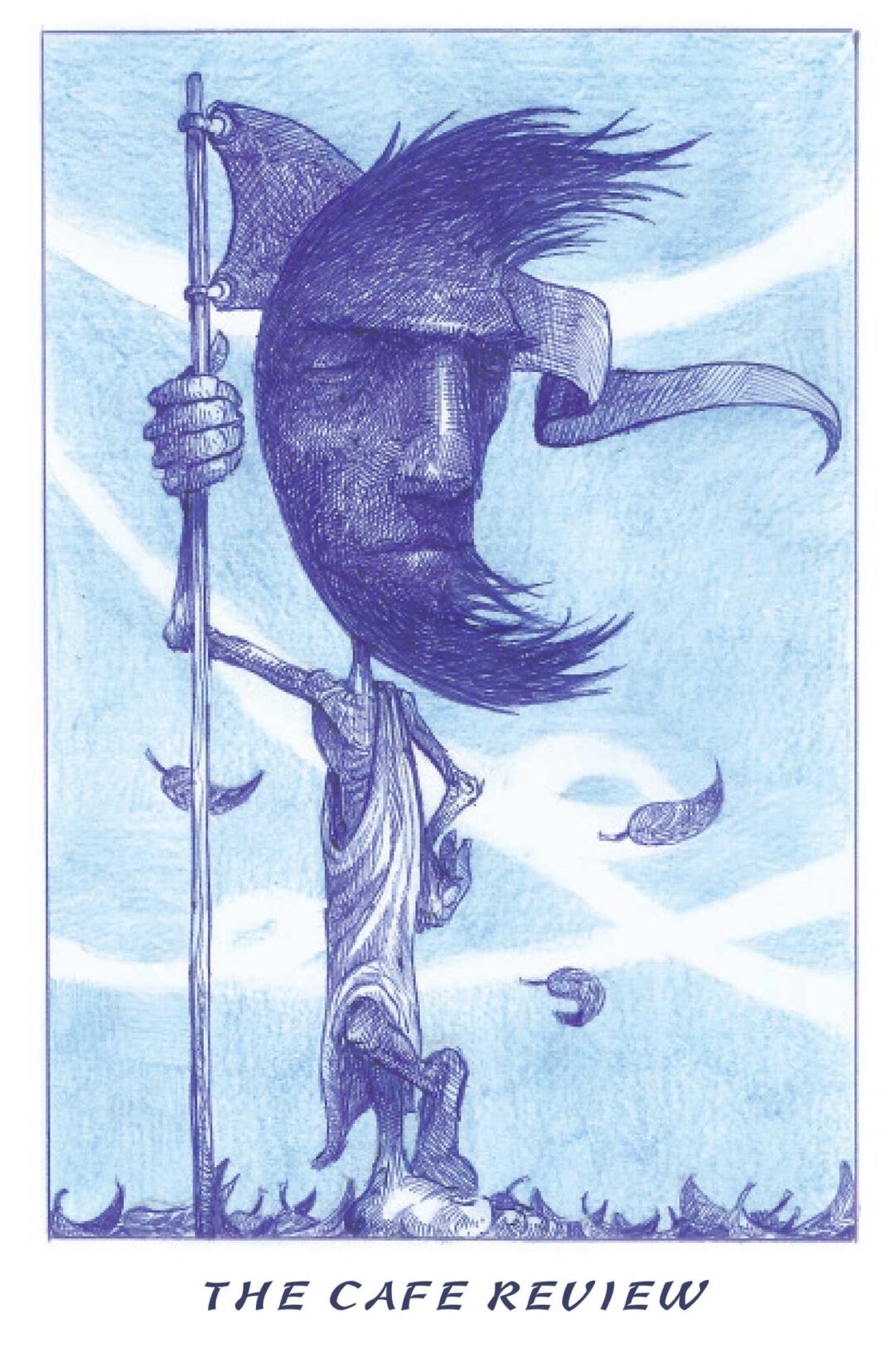Amanda Tackles the Future

By Thomas Feeny
Amanda sits cross–legged
left to herself
nailed to the front porch
She pops her gum and watches
as the sun bleeds across
the horizon.
If she were a cat, right now
she’d be off to prowl
the neighborhood, slipping
on down to the riversmouth
where, padding through rushes,
she could feed her hunger,
black tail waving to the plinking
of guitars.
But no feline, Amanda waits alone,
held by the rapture of nightfall,
another mystery she loves and hates.
Slapping at mosquitoes, she
can’t help but envy her best friend
Rayette, who with one bag & a bus ticket
last week ran off to Chicago.
“The big city, that’s the place,”
says Amanda’s ma. “If a girl don’t
shimmy her way to stardom, — shoot,
she can always swing it in a hash house.”
The Well

By Henry Israeli
When my cat was dying
she only wanted to purr in my lap
and when I asked her how much pain
she was in, she blinked once.
In the morning I found her sprawled out
and stiff, her eyes utterly still,
reminding me of how my father,
years after losing his mind,
slipped away on a hospital bed
with no sheet covering him
while I held his hand, still warm,
and counted its freckles for the last time.
In my chest, I had a feeling
of neither sadness nor relief:
imagine a rock lowered into a well
until it barely touches the water’s surface
and then quickly sinks.
Then imagine you are that well.
Immigrant song

By Henry Israeli
Robert Plant’s primal yell propelled us
through FM radios we listened to in glorious
stereo on the same station at the same time
in cars almost too wide to fit in a lane.
We children of immigrants joined his blissful
howl generations deep declaring that
from the land of ice and snow we came,
landing on far off shores, ending up
on the streets of suburbs where sprinklers
wake us every morning all summer long,
where families fashion themselves anew
like gloms made of blood and snow
As we rode bikes past the brown brick houses
we heard different accents, different mouths
struggling to speak words of a new language
behind every door of our circular street.
Back then we were all immigrants and knew it:
we ate kielbasa, kishka, ballpark dogs,
and watery chop suey on Christmas eve, danced
with our hands high in the air aping
Anthony Quinn’s Zorba on TV, we blew our noses
a hundred different ways. At night, if you stood
below our windows you could hear us singing.
The World Without Words

By Henry Israeli
I was surprised how quickly
I was able to bring the hammer down
on the mouse’s head. It was tugging
at its own hind legs, trying to shift
the bulk of itself out of the sticky
tight black square. My wrist snapped down
and it was as if a switch turned off —
head flattened, thick brown fluid
coming out its ears, its body strangely
still, not twitching, the way
I imagined the dead do.
*
The house grew bigger
after my father moved into
the basement, its pink brick
facade swelling into
something not quite home.
I roamed the hallways
pretending to be anything
not me, so many rooms,
all silent, all empty.
*
After my surgery I was left
with a hole on the right side
of my abdomen, a hole through which I could see
my intestines shining through
like a little gift of a Christmas gumdrop.
I felt exposed, mute, like a worm chopped in half,
each side still wriggling
in a dance mimicking life.
*
Solzhenitsyn wrote of a boy, barely
fifteen years old, who spoke to Gorky
when he was visiting a Gulag and told him
of men tied to logs rolled down
the long flight of stone stairs that monks
built centuries earlier, men put
in small damp cells in freezing temperatures,
stripped to their underwear, given half rations,
men worked to death cutting down larches
or mining copper. “To do evil,” wrote Solzhenitsyn,
“a person must believe he is doing good.”
As a reward, the boy was shot in the head,
and Gorky, in a rare act of silence,
never said a word about what he’d heard.
*
My father was still young
when he first showed symptoms,
memory loss, then hallucinations,
a look of dread
making his green eyes greener.
As time marched on, he grew agitated,
sometimes succumbing to fits of rage
that wiped him out so much
that he would have to lie down,
his chest rising quickly, out of breath,
wordless, his forehead covered in sweat,
I looked at the pillows that propped him up.
How easily one could be used
to end this endless loop
of both our suffering.
*
I put the rodent in a black plastic bag,
a kind of makeshift shroud,
said, I’m sorry, I had nothing
against it, didn’t wish to smash
in its little head. I had no choice,
1 explain, because humans and mice
can’t live together under one roof,
something about disease, bags of flour
torn open, trails of turf at the bottom
of the pantry. I did it quickly as I could,
and whispered to its dead ears
that if the dogs had gotten to it
or if it had chewed off its own
hind legs, oh what a slow painful death.
My father left the world without words.
For years he’d only made guttural primitive sounds
and wept bitterly, sometimes for hours on end.
It was as if all the many languages he’d once known
leaked out of him.
At the end, like the saying goes, he was quiet,
quiet as a mouse.


